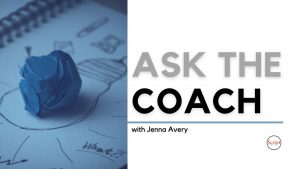
by Jenna | Nov 17, 2023 | ScriptMag Articles
In this month’s “Ask the Coach” article, I’m addressing — with help from Screenwriter Jeff Howard (‘Midnight Mass,’ ‘Haunting of Hill House,’ ‘Oculus,’ ‘Ouija: Origin of Evil,’ ‘Gerald’s Game’) — two similar but separate questions from readers about character arc and character development:
Question 1: How to develop a character arc that is consistent with the story?
Question 2: How to continue developing your characters throughout the story?
Here are the main insights discussed in response:
- Character or plot first?
- Imagine your plot and character together from the start.
- Intertwine character and action early.
- Don’t worry about ‘core wounds,’ etc.
- Think of your character as a real human being — always trying to win.
- See character as living through the eyes of another person.
- Embrace action and character as one and the same.
To me, good character work is living within the moment of what’s happening — the actual moments of the story — not laying some construct of life-changing stuff on top of your story.
— Jeff Howard
Want the full scoop? Get all the details in the full article on Script Mag:

by Jenna | Oct 19, 2023 | ScriptMag Articles
In this month’s “Ask the Coach” article, I’m addressing a collection of shorter questions from writers wondering about getting started with screenwriting, writing and learning screenwriting in another country, getting an MFA, and finding other screenwriters.
My responses include:
- Steps to begin exploring and learning screenwriting
- Tips for finding writing mentors
- How to evaluate whether an MFA program could be a good fit
- The challenge of the term thick skinned
- Where to find writing groups online, especially for screenwriters
There really are no “shoulds” with writing. There are so many paths forward, and it’s about choosing what resonates with you the most.
Want the full scoop? Get all the details in the full article on Script Mag:

by Jenna | Sep 21, 2023 | ScriptMag Articles
In this month’s “Ask the Coach” article, I’m addressing a set of questions from a reader about managing self-doubt in writing.
“[My] fear of failure has several prongs for me:
1. What if no one likes my writing? I’m trying to make it as truthful as it is filled with emotion and colorful descriptions, but maybe it’s just me because I relate to it all.
2. I’m currently writing a memoir that involves some memories of my parents and their failures — but good memories also. I feel guilty/disloyal for writing about their failures, but to some extent that’s where the strength of the story lies.
3. What I create in my head as I’m falling asleep never seems to be as great when I put it into my computer.
4. I suffer off and on with imposter syndrome, but I usually like what I write in the end.”
This is a set of challenging questions so many writers wrestle with. It reads to me like issues of self-doubt more than a fear of failure, though the two are intertwined.
First let me say this: In working with writers all over the world, being a writer myself, and reading first-hand accounts of seasoned, professional writers, so many if not all writers deal with self-doubt and fear much of the time (including me).
Here are the 6 antidotes I discuss in my response:
- Use self-doubt as a clue that what you’re working on is important.
- Trust that truth transcends differences.
- Ask yourself empowering questions.
- With memoir, write for yourself first.
- Embrace the vision while also welcoming imperfection.
- Trust the process.
The real key to all of this is learning to manage the doubts and the fears so they don’t stop you from writing, and so that they don’t make the experience of writing miserable along the way, by triggering overwhelming negative self-talk, habitual procrastination, perfectionism, and even shame.
Want the full scoop? Get all the details in the full article on Script Mag:

by Jenna | Aug 18, 2023 | ScriptMag Articles
With the start of school and fall on the horizon, there’s this energy many of us naturally connect to that feels motivating and inspiring to start new things, take action, get organized, and make things happen. Lean into this energy and let it buoy you toward the momentum and progress you’re wanting.
In this month’s “Ask the Coach” article, I’m addressing a question regarding getting back to writing after summertime.
“My kids are starting school again. (Whew! Ack!) Truth be told, it’s been hard to write this summer with so much going on between family vacations and organizing summer camps. How can I regain my momentum after a rocky summer, writing-wise?”
Hey, good question! Many screenwriter-parent types are asking ourselves similar questions right now. Whether you’ve been writing intermittently, or not at all, the good news is that as your kids head to their classrooms, you can tap into the “back-to-school” energy they’ll be experiencing too.
And this is true whether or not you’re a parent. There’s a natural activation energy that arises in the fall and spring in particular, so this is a smart time to revisit your writing practice and give it a refresh if needed.
Here are the 7 steps I discuss in my response:
- Remind yourself to treat writing like a pro.
- At the same time, allow writing to be fun and joyful.
- Lean into the back-to-school activation energy.
- Revisit your writing practice.
- Remember, you can ramp up gradually.
- Keep going to keep going.
- Be ready to adapt.
Want the full scoop? Get all the details in the full article on Script Mag:

by Jenna | May 19, 2023 | ScriptMag Articles
In this month’s “Ask the Coach” article, I’m addressing two questions regarding finding representation and connecting with producers (and some notes about navigating these appropriately during the Writer’s Guild strike).
Here are some of the action steps I discuss in my response:
- Do the research to find the companies and individuals that are a good fit. (With recommended resources.)
- Look for ways to connect.
- Nurture relationships over time.
- Build your own overall network of industry contacts that may naturally lead to an introduction at some point.
Focus on genuinely connecting with managers you think could be a good fit for you and your work. Follow them. Read what they post. Respond authentically when appropriate. Help out with something they’re looking for. Relationships evolve organically when nurtured over time. Keep an eye out for an opportunity to work together to arise, naturally.

by Jenna | Apr 22, 2023 | ScriptMag Articles
In this month’s “Ask the Coach” article, I’m responding to two questions about writing scene descriptions, including seeing it as an opportunity for your voice to shine, and where to draw the line with what to include and what to leave out.
Here are the main points I discuss in my response:
- Scene descriptions can be a delightful way to design your pages.
- Scene descriptions are a place where your voice gets to shine.
- Include thoughts and emotions in scene descriptions sparingly.
- Focus on what’s truly important to the story when writing descriptions.
Writing scene descriptions offers a unique opportunity for screenwriters to feature their voice, style, and creativity. Allow it to come through with all the choices you make, while striking the balance between creating the blueprint for the visual, cinematic world of your story, keeping your writing open and flowing on the page, and giving your readers and audience insights into the depths of your characters and the critical information they need to follow the story.
Photo by Ron Lach on Pexels







